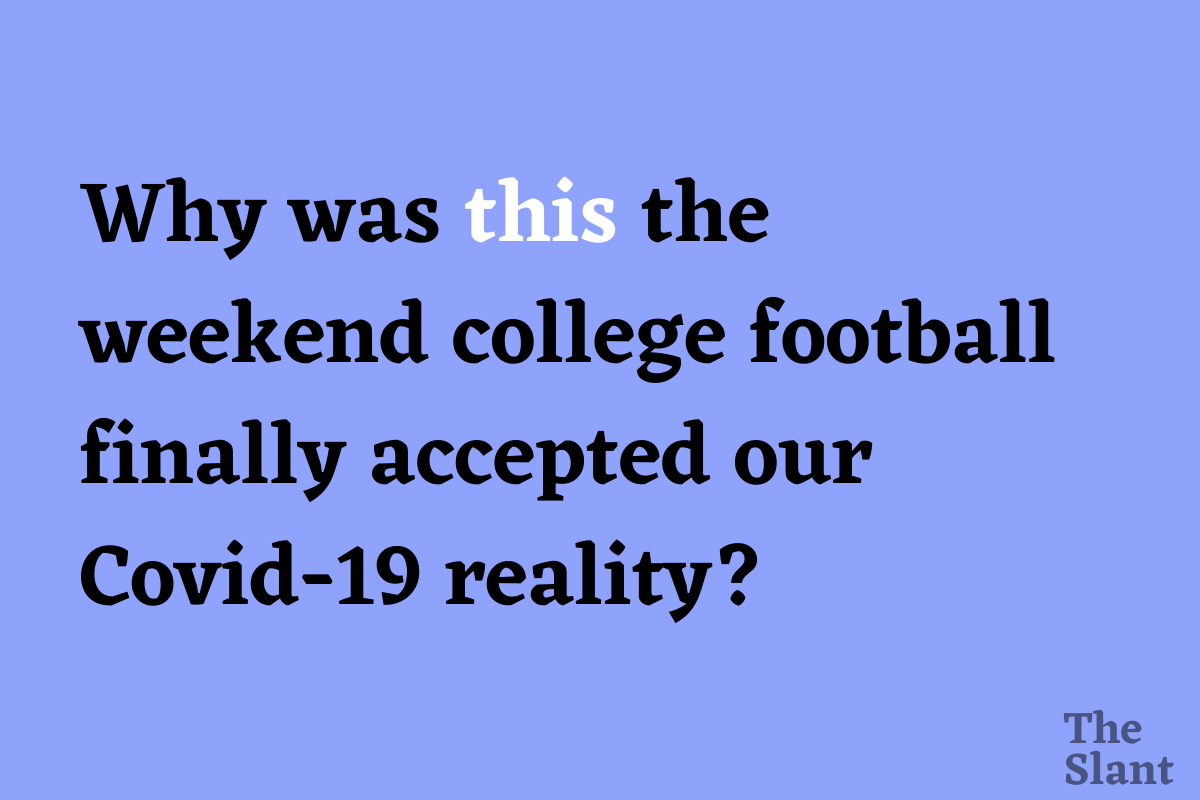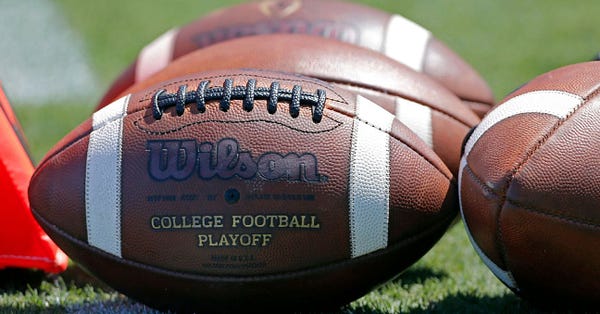Why was this the weekend college football finally started to accept reality?
After weeks of some people saying "the college football season is in peril," the college football season really looks like it's in peril.
The weekend started fresh off news that many conferences had released tentative 2020 schedules. It ended with the acknowledgement, from anonymous athletic directors for the most part, that a 2020 season won’t happen.

After months and months of waiting, of trying to practice, of stops and starts, college administrators are starting to publicly, though anonymously, admit the season is screwed. At least for the fall.
Several sources have told ESPN over the past 48 hours that the postponement or cancellation of the football season seems inevitable. Many of those sources believed it ultimately will take a Power 5 conference to move things in that direction and that either the Big Ten or Pac-12 would probably be the first league to do it.
"In the next 72 hours college football is going to come to a complete stop,” one industry source said.
"It's not fair what we're doing to our coaches and student-athletes," one long-time Power Five AD said. "The sooner we can come to a finality, the better."
"I think it's inevitable [the season will not be played in the fall]," said another veteran Power Five AD.
"Nobody wanted to be the first to do it," a Power 5 coach told ESPN, "and now nobody will want to be the last."
The reality of college football in our current pandemic situation has been apparent for a bit. So what made this weekend different?
Here’s how things went down, at least from a thousand-foot view.
The MAC became the first conference to bump college football to the spring, announcing its intention to do so on Saturday. Some FCS conferences and UConn had already made similar decisions, but the MAC’s might give some Power 5 conferences an excuse to do the thing they’ve known for a while now they’d have to do. Later on Saturday:



By Sunday night, we were here:



Why is this happening now? Well, we’re only a week or two past when college football’s leaders said they’d have to make these decisions. Late July was originally the timeframe floated out there for The Big Decision.
“We believe that late July will provide the best clarity for making the important decisions ahead of us,” SEC commissioner Greg Sankey said on July 13.
"The league membership and our medical advisory group will make every effort to be as prepared as possible during these unprecedented times, and we anticipate a decision by our Board of Directors in late July," ACC commissioner John Swofford said on July 10.
August 10 is definitely not late July, but it’s not surprising that, with millions of dollars on the line, the decision to cancel the season is taking a while. Of course, every day they don’t make a decision is a day colleges risk more players becoming infected on their watch. Probably something that should make you act quickly if you really have player safety in mind. Nevertheless. Even in a practical, “how do we even play a game” standpoint, the sport is woefully unprepared. Some teams can’t even practice with everyone on the field at the same time! That’s what Randy Edsall described as a big reason why he knew a UConn season wasn’t going to happen:
The head coach of UConn football noted it took 10-12 days to get COVID-19 test results back. Despite no positive tests, less than one-third of the team had been able to participate in every workout, due to isolations when a teammate showed symptoms. One walkthrough had just eight offensive linemen.
As John Talty wrote a few weeks ago for AL.com, many school administrators put a positive spin on their coronavirus takes early on:
Another athletic director described the early pessimism as a targeted PR campaign and warned against watching too much cable news COVID-19 coverage because “you can convince yourself things are far worse than they really are.” Athletic directors and football coaches with similar viewpoints felt the need to fight back against the early narratives football wouldn’t happen, banking on the situation markedly improving by July or August.
Well it’s August, and things obviously aren’t better. The virus is more widespread now that it was in May or June. Teams have been stopping and starting workouts due to Covid exposures, and the differing protocols in how those are handled (Rutgers shut down team activities for two weeks, Clemson did not say it stopped practicing when players tested positive) laid bare just how disorganized college football’s attempt as staging a season was, and exposed (for like the millionth time) a leadership vacuum at the top.
Some colleges are about to bring students back on campus, a clear threat to the health of those students and to athletes who would be sharing their classrooms. Many schools don’t seem to have plans to combat that. There’s an unprecedented labor movement among the sport’s unpaid athletes that shows no signs of slowing down.
But most of all, you can’t play college football as it currently exists during a pandemic. An NBA or WNBA-like bubble would be the only way you make things safe enough for players. MLB’s attempt at playing a season shows the dangers trying sports outside of a bubble, and that’s still a situation where players have representation and bargaining power. College football could have made progress on any of these things over the summer, but instead chose not to. Canceling or postponing the season isn’t a decision anyone wants. It’ll put staff, players, media members and anyone who depend on the sport in a perilous position. But it’s the best option right now.
Thanks for reading. If you like what you see here, I hope you’ll tell a friend and follow along on Instagram.

